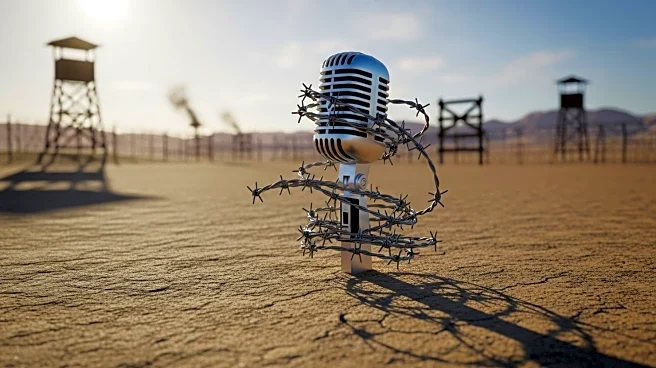What's Happening?
The Israeli government has faced criticism for restricting media access in Gaza, particularly during ongoing conflicts. This criticism has intensified following recent incidents where journalists were killed in military strikes. The use of 'double-tap' strikes, which involve a second attack shortly after the first, has been highlighted as particularly dangerous for journalists and emergency personnel who are often first responders. The Israeli military recently shelled Nasser Hospital in southern Gaza, claiming it targeted a Hamas surveillance camera, resulting in the deaths of at least 20 Palestinians, including five journalists. Prime Minister Netanyahu described the incident as a 'tragic mishap' and promised a military investigation, but concerns remain about the safety of journalists and the transparency of information coming out of Gaza.
Why It's Important?
The restriction of media access in conflict zones like Gaza has significant implications for international journalism and the public's understanding of the situation. The ability of journalists to report freely and safely is crucial for transparency and accountability in war zones. The Israeli government's actions have raised concerns about the protection of journalists and the potential suppression of information. This situation affects not only the journalists involved but also the global audience that relies on their reporting to understand the complexities of the conflict. The broader impact includes potential shifts in international relations and public opinion regarding the Israeli-Palestinian conflict.
What's Next?
The Israeli government's promise of a military investigation into the recent incident may lead to changes in military tactics or policies regarding media access. International pressure from media organizations and human rights groups could influence Israel to reconsider its approach to journalists in conflict zones. Additionally, ongoing debates about the role of media in war zones and the responsibilities of governments to protect journalists may lead to further discussions at international forums. The outcome of these discussions could impact future media coverage and the safety protocols for journalists in similar situations.
Beyond the Headlines
The situation in Gaza highlights broader ethical and legal issues surrounding media access in conflict zones. The balance between national security and freedom of the press is a contentious issue, with implications for international law and human rights. The portrayal of journalists as potential combatants by the Israeli government raises questions about the role of media in conflict and the responsibilities of governments to ensure their safety. This development may lead to increased advocacy for stronger protections for journalists and more robust international standards for media access in war zones.










